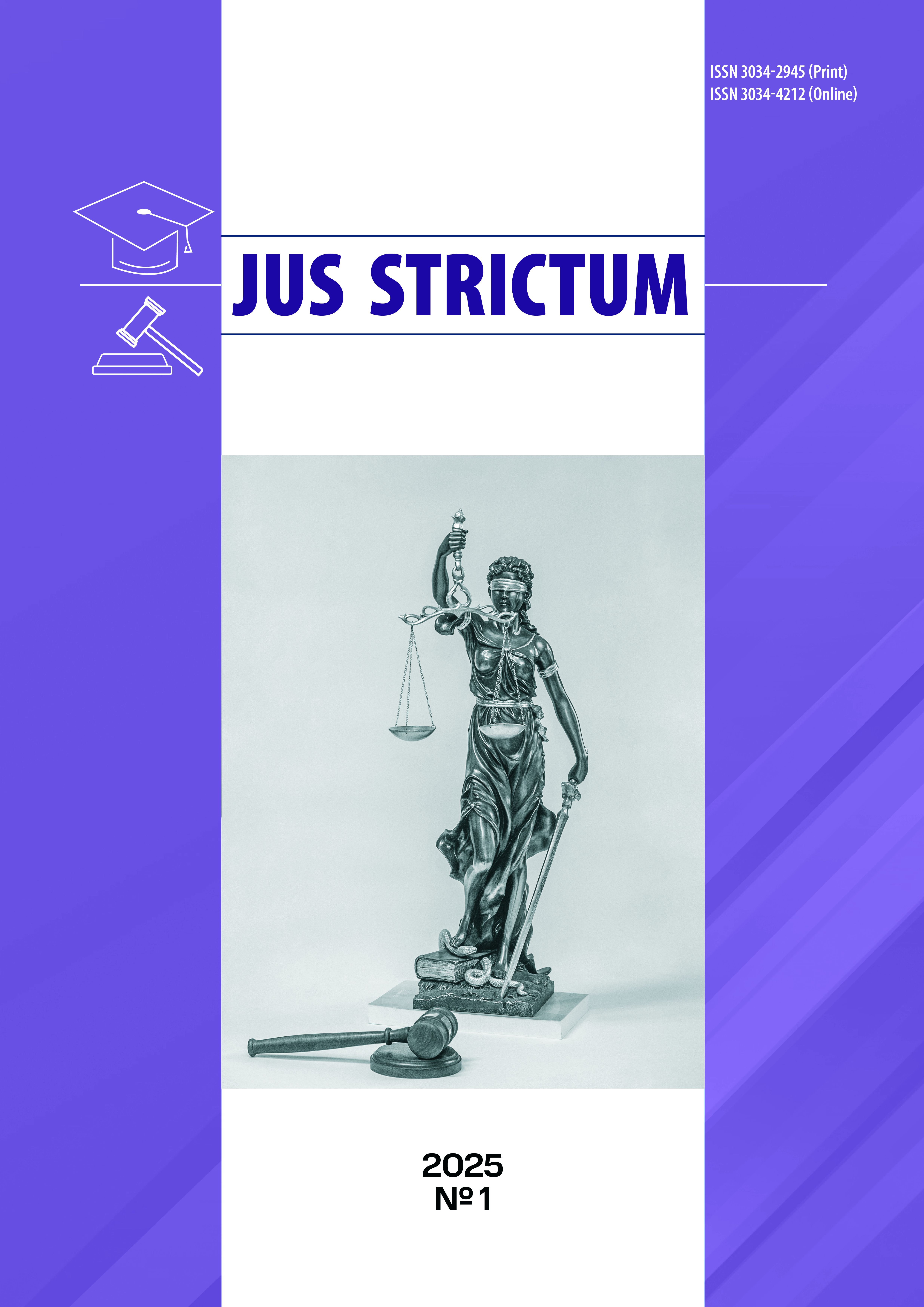№ 1 (2025)
- Год: 2025
- Дата публикации: 31.03.2025
- Статей: 4
- URL: https://vektornaukipravo.ru/jour/issue/view/46
-
Описание:
Опубликовано 31.03.2025.
Весь выпуск
О реализации правоохранительной функции государства в уголовном процессе
Аннотация
В статье представлено авторское видение организации сбалансированного досудебного производства на основе функционального разграничения деятельности государственно-властных субъектов, обеспечивающих исполнение публично-правовых обязанностей государства в уголовном процессе. Анализируя деятельность органов, осуществляющих оперативно-розыскную деятельность (ОРД), органов предварительного расследования и прокурора в досудебном производстве, автор исходит из направленности их деятельности на обеспечение интересов государства в борьбе с преступностью при использовании различных форм государственно-властной деятельности – раскрытия преступлений, расследования преступлений и уголовного преследования виновных лиц. Взаимодействие государственных органов по раскрытию и расследованию преступлений и их общая нацеленность на установление обстоятельств совершенного деяния позволили критически оценить действующие нормы УПК РФ, исключающие ОРД и ее результаты из предмета уголовно-процессуального регулирования, и обосновать вывод о целесообразности объединения этих видов деятельности в одной уголовно-процессуальной функции – функции раскрытия и расследования. Отсутствие правового регулирования деятельности прокурора по осуществлению уголовного преследования в досудебном производстве и отсутствие правовых норм, регламентирующих порядок формирования и выдвижения государственного обвинения, позволили обосновать вывод о необходимости функционального обособления уголовного преследования в качестве самостоятельного направления деятельности – функции уголовного преследования. На основании полученных результатов предложена правовая модель реализации правоохранительных уголовно-процессуальных функций в досудебном производстве, включающая: 1) функцию раскрытия и расследования преступлений, объединяющую два вида государственно-властной деятельности – раскрытие преступлений органами, осуществляющими ОРД, и расследование преступлений органами предварительного расследования, при руководящей роли последних; 2) функцию уголовного преследования, осуществляемую прокурором посредством формирования и выдвижения государственного обвинения и последующего инициирования судебного разбирательства по уголовному делу. На основе представленной классификации правоохранительных функций уголовно-процессуальной деятельности делается вывод о необходимости законодательного переструктурирования досудебной части уголовного процесса.
 7-13
7-13


О функциональном разграничении полномочий прокурора в уголовном судопроизводстве
Аннотация
В статье исследуется функциональное разграничение полномочий прокурора в уголовном судопроизводстве, включая надзор за органами предварительного расследования, уголовное преследование (формирование и поддержание государственного обвинения) и правозащиту. Проблема заключается в размытости границ данных функций, недостаточной законодательной определенности и наличии противоречивых доктринальных подходов. Проведен анализ действующего законодательства, научных концепций и правоприменительной практики с целью выявления особенностей распределения полномочий прокурора. Установлено, что надзор за органами предварительного расследования является исключительной компетенцией прокурора, что исключает возможность его делегирования. Уголовное преследование, напротив, представляет собой самостоятельное направление деятельности, в рамках которого прокурор инициирует преследование, утверждает обвинительные заключения, акты, постановления, а также поддерживает государственное обвинение в суде. Особое внимание уделено правозащитной функции прокурора, которая включает контроль за соблюдением конституционных прав граждан и защиту публичных интересов. На основе проведенного анализа предложены изменения в ст. 37 Уголовно-процессуального кодекса РФ, направленные на устранение правовых пробелов, усиление прокурорского надзора и четкое разграничение его полномочий. Результаты исследования могут быть использованы для совершенствования законодательства, а также при разработке научных подходов к регулированию деятельности прокуратуры в уголовном судопроизводстве.
 15-22
15-22


Следственные действия как способы собирания и формирования доказательств
Аннотация
В статье рассматриваются конкурирующие в теории уголовного процесса концепции следственного действия как способа собирания доказательств и как способа формирования доказательств. Путем исследования механизма взаимодействия органа предварительного расследования со следами преступления автор обосновывает нетождественность понятий «собирание доказательств» и «формирование доказательств» с целью определения места каждого из них в системе уголовно-процессуальных действий. Показано, что дискуссия о природе следственного действия порождена сложным многосоставным и неоднозначным понятием доказательства, имеющим информационное (познаваемое) содержание и сохраняющую это содержание внешнюю форму, как независящую от действий следователя, дознавателя, так и создаваемую (формируемую) им в ходе производства следственных действий. По мнению автора, в основе двух рассматриваемых в статье научных концепций о гносеологической природе следственного действия лежит различие между готовыми (паратусными, по определению С.Б. Россинского) доказательствами и доказательствами, получающими процессуальную форму в процессе производства следственного действия. Учитывая отмеченную в статье нетождественность понятий «собирание доказательств» и «формирование доказательств», автор отвергает высказанное в науке предложение о замене первого термина вторым. Каждый из них обладает собственным содержанием, и ни один не является универсальной характеристикой следственного действия, в структуре каждого из которых есть как правила, регулирующие процесс собирания доказательств, так и правила, касающиеся формирования доказательств. Формулируя предложение о классификации доказательств на собираемые (получаемые) и формируемые исходя из степени влияния познавательной деятельности следователя, дознавателя на их содержание, автор обосновывает вывод о невозможности классифицировать сами следственные действия на способы собирания доказательств и способы их формирования.
 23-30
23-30


Некоторые особенности в обязательствах сторон по договору аренды
Аннотация
На сегодняшний день общие и специальные положения Гражданского кодекса Российской Федерации о договоре аренды предоставляют возможность выделить некоторые особенности в обязательствах сторон, которые могут свидетельствовать об отдельных проблемах осуществления таких обязательств. Поэтому мы попытались обнаружить связанные с этим проблемы и подвергли определенному анализу основные обязательства сторон в договоре аренды. В результате на поверхности нашего внимания оказались проблемы, связанные с достижением сторонами договора аренды главного пользовательского эффекта, позволяющего арендодателю и арендатору быть удовлетворенными заключенным договором. Главным образом с помощью формально-юридического метода исследования, методов системного и сравнительного анализа мы обнаружили некоторые проблемы, связанные с обязательствами арендодателя по созданию и обеспечению условий для надлежащего владения и пользования объектом аренды, а также обязательствами арендатора по надлежащему использованию такого объекта, его должному содержанию и необходимому обслуживанию. Полученные результаты исследования позволяют нам говорить о том, что нормы гражданского законодательства об аренде могут быть конкретизированы в сфере осуществления арендатором своего обязательства по надлежащему использованию арендованного имущества с учетом ответной конкретизации обязательства арендодателя по созданию и обеспечению для этого соответствующих условий. Мы пришли к общему выводу, что предлагаемая конкретизация положений гражданского законодательства не может быть полностью заменена усмотрением самих сторон в договоре аренды. Основной результат исследования заключается в том, что проблема ненадлежащего использования или фактического неиспользования объекта в период действия договора аренды создает для арендодателя определенные трудности, которых можно было бы избежать более детальным правовым регулированием соответствующих обязательств арендатора, а также некоторых общих обязательств сторон договора.
 31-39
31-39








